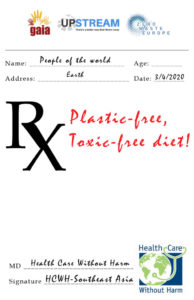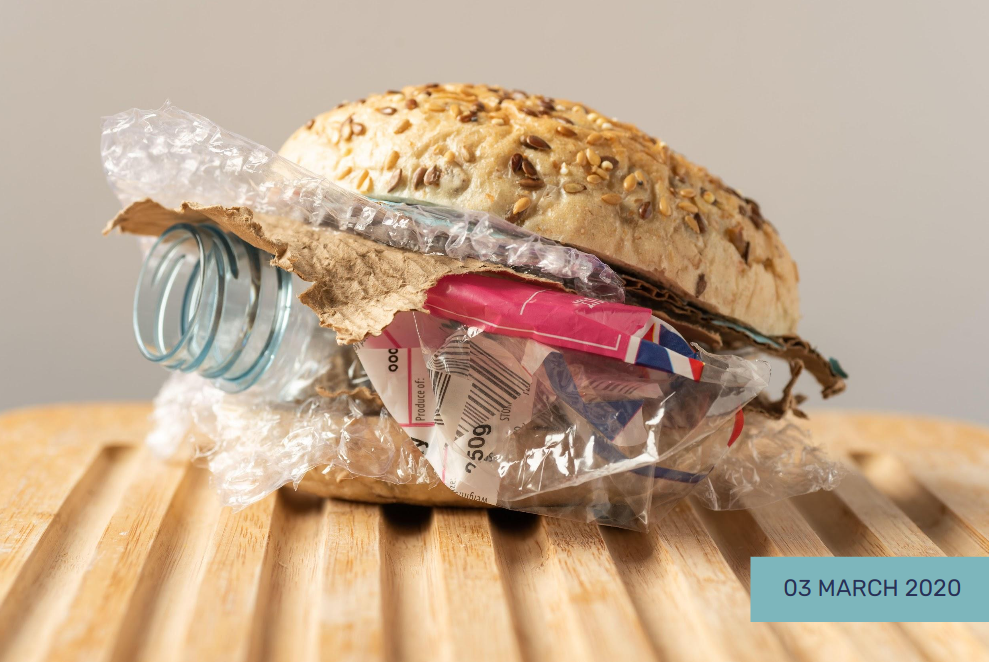Australia/India/Malaysia/Nepal/Philippines—Close to 200 environmental and public health organizations led by the UNWRAPPED Project (UPSTREAM, Zero Waste Europe, and GAIA) released a Call to Action in response to a recently issued peer-reviewed Scientific Consensus Statement signed by 33 world-renowned scientists warning chemicals used in single-use plastics and food packaging represents a significant threat to human and planetary health-particularly the health of children.
The Consensus statement clearly states the facts:
- Approximately 12,000 chemicals are intentionally used in packaging and other forms of food contact materials
- An enormous body of research – over 1200 studies- shows that these chemicals migrate from packaging into food and beverages
- Amongst those chemicals, many have been proven hazardous for human health: exposure may lead to cancer, heart disease, inflammatory bowel disease, rheumatoid arthritis, genotoxicity, chronic diseases (such as atherosclerosis, cancer, diabetes, cardiovascular diseases), and autoimmune diseases
- Many of these chemicals are never tested for human health effects
- For most of these chemicals, their presence is undisclosed
Many of those chemicals, including phthalates, bisphenols and PFAs, are used in single-use packaging, made of plastic but also paper & board. The lack of disclosure by producers regarding chemicals used in packaging means that the risks associated with the use of those packaging cannot be evaluated. Consumers and regulators aren’t the only ones in the dark — many packaging producers and waste managers are unaware of the chemicals present in the packaging they process and possibly recycle in other products.
Hence, close to 200 organizations signed the Call to Action and demanded regulators and industry to protect public health and the environment by acting to:
- Ensure full disclosure and traceability of chemicals used in packaging throughout the supply chain;
- Restrict the use of hazardous chemicals in food packaging (and products), and prevent regrettable substitution; and
- Adopt policies that support the transition towards safe, reusable, and refillable packaging.
The Call to Action is launched globally with simultaneous media events in the Asia Pacific region (Australia, India, Malaysia, Nepal, and Philippines).
We are in close contact with plastic toxins daily and our exposure to chemicals continue to grow as plastic continues to be produced and used. Plastic is not only out there, it’s in all of us! Consumers can make a difference by refusing single use plastics and food packaged or wrapped in plastics. Stay safe, revive our traditional practices. – Mageswari Sangaralingam, Consumers Association of Penang (Malaysia)

The ever-growing body of evidence that plastics is not only damaging our environment but is also a menace to health underscores the urgent need to transition away from single-use plastics, especially as food packaging. The health and environmental havoc that single-use plastics bring far outweigh any of their perceived benefits, and it is time for us to be smart and start avoiding them to protect our health. Nothing is more vital than our health, and nothing sustains life better than a healthy environment. – Ramon San Pascual, Health Care Without Harm-Southeast Asia (Philippines)
Australia is on the cusp of significant systemic change following the decision to ban waste exports to our Asia Pacific neighbours. This week the Australian government held a National Plastics Summit to respond to the global plastic pollution crisis. The success of these initiatives will depend upon the Australian government's recognition that plastic food packaging currently represents a global human health threat. Unless immediate action is taken to address the systemic regulatory failures that have allowed toxic and hazardous substances to be used in plastic food packaging, then there is a very real likelihood that Australia’s circular economy will be poisoned and further harm caused to human health, our environment and future generations. The Australian government must act swiftly to eliminate toxic and hazardous substances from plastic food packaging and require full life cycle assessments of all chemicals used in plastic production. It is well past time for the plastic packaging industry to be held accountable for their design failures and the adverse global consequences this has inflicted on human health and our planet. – Jane Bremmer, National Toxics Network (Australia)
Plastic packaged food has flooded the Himalaya in recent times, dramatically changing food habits, especially of the younger generation. This enticement and promotion of ill health needs to stop. These plastic packaging litter the entire Himalaya and retrieving it is near impossible in the high mountain. – Priyadarshinee Shrestha/Rajendra P. Gurung/Roshan Rai, Zero Waste Himalaya, India
For many years in Nepal, we serve our food in leaf plates and clay cups during big social or religious festivals. Similarly, when we go shopping, we used to get the items in paper or leaf packaging and for liquid items, we get it in glass or metal pots. We were practicing Zero Waste in Nepal for as long as I can remember. But nowadays, everything is packed in plastics and other packaging loaded with toxic chemicals. It is time we return to our traditional practices and discourage the use of those packaging to make ourselves healthy while promoting Zero Waste. – Mahesh Nakarmi, HECAF360 (Nepal)
Our communities are a rich resource of traditional materials, practices and systems that worked without exposing the consumer to the toxic chemicals that came with plastic food packaging. We got sidetracked for a few decades by the plastic packaging industry. It’s time to reject this plastic-packaged food culture and reclaim and, if necessary, update and scaleup on the sensible, safe alternatives we used to have. – Beau Baconguis, Plastics Campaigner, GAIA Asia Pacific
In the Philippines, so much of our food is in plastic bags and plastic containers and some people even microwave food in plastics, yet many studies have shown that chemicals can migrate from plastics into food. About half of the nearly 12,000 chemicals allowed as food additives are food contact chemicals (FCCs) but many of them have never been tested for endocrine disruption and other hazardous properties. – Dr. Jorge Emmanuel, Silliman University, Dumaguete, Philippines
Call to Action https://www.unwrappedproject.org/call-to-action
Scientific Consensus Statement https://www.unwrappedproject.org/scientific-consensus
Links to national press releases:
New scientific report reveals toxic and hazardous chemicals in plastic food packaging (Australia)
International experts call for food packaging safety measures (Philippines)
ENDS
Contact:
Sonia G. Astudillo, GAIA Asia Pacific Communications Officer, +917-5969286; sonia@no-burn.org
Jane Bremmer, National Toxics Network (Australia); acejane@bigpond.com
Roshan Rai, Zero Waste Himalaya (India); rairoshan@gmail.com
Mageswari Sangaralingam, Consumers Association of Penang (Malaysia); magesling@gmail.com
Mahesh Nakarmi, HECAF360 (Nepal); mahesh.nakarmi@gmail.com
Pats Oliva, Health Care Without Harm-Southeast Asia Communications Officer (Philippines); poliva@hcwh.org
Notes
GAIA (Global Alliance for Incinerator Alternatives) is a worldwide alliance of grassroots groups, non-governmental organizations, and individuals whose mission is to catalyze a global shift towards environmental justice by strengthening grassroots social movements that advance solutions to waste and pollution.
UPSTREAM works with businesses, schools, and communities to transition to a throw-away-free culture. We have launched campaigns across the country to make single-use history and “indisposable” the new norm.
Zero Waste Europe is the European network of communities, local leaders, businesses, experts, and change agents working towards the elimination of waste in our society.
We empower communities to redesign their relationship with resources, and to adopt smarter lifestyles and sustainable consumption patterns in line with a circular economy.




